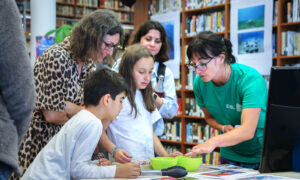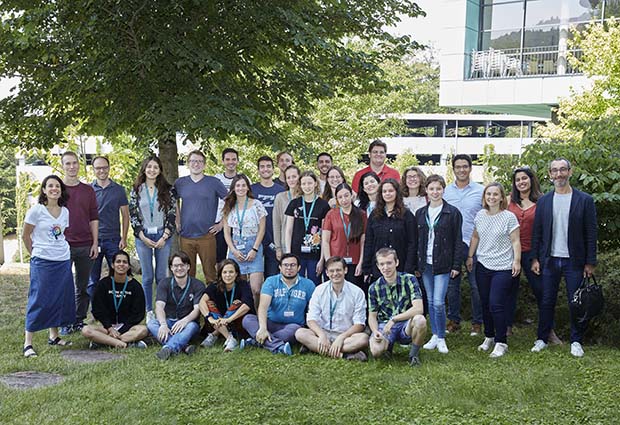
EMBL Lautenschläger Summer School success
Visualising life in an interdisciplinary research environment

The EMBL Lautenschläger Summer School was established to inspire students from fields such as physics, maths, engineering and computer science to pursue interdisciplinary research in the life sciences. The inaugural programme ran from 15–26 July at EMBL Heidelberg, with 20 students from 18 countries, including 13 EMBL member states. The Summer School is made possible thanks to a substantial gift from the Manfred Lautenschläger-Stiftung and further generous donations.
The two-week programme – on the theme Visualising Life – offered the students a unique opportunity to experience first-hand the interdisciplinary nature of EMBL’s research environment. In the practical sessions they built compound microscopes to image the development of the sea anemone Nematostella vectensis, and wrote code to extract information from a large dataset of images. The workshops were complemented by lectures and talks by EMBL group leaders, postdocs and PhD students. In line with the underlying principle of ‘Talents teach talents’, PhD students were actively involved in all aspects of the programme, gaining valuable teaching experience throughout.

Exciting curiosity about biology
“The goal was to get students from other disciplines excited to work in biology, and especially at EMBL,” explains group leader Robert Prevedel, one of the summer school’s organisers. “We wanted to show how interdisciplinary the research is, and that as a physicist, or mathematician, or computer scientist you can make a valuable contribution here. Hopefully, it will inspire them to think about pursuing a career outside of the traditional fields.”
Group leader Anna Kreshuk, also one of the summer school’s organisers, understands what it’s like to make the transition into biological research, having studied computer science before she became interested in biology. “Giving the students an idea of all the interesting things they could do in biology with their science was very cool. Now they have a much better understanding of where else they could go, and how much these kinds of skills are needed elsewhere. I’m fascinated by the technologies that can be developed to help answer biological questions, and I hope many of the students will find similar fascinations too.”
Fellow group leader and organiser Aissam Ikmi agrees: “The students’ engagement and interest in biology were reflected in the deep and challenging questions they asked during the lectures. I have no doubt that this initiation into experimental biology will make them more confident about considering a career in biological research. We feel the summer school has been a complete success.”
Nothing hinders you from participating and learning at EMBL
Maria Aquilina, a first-year student and the youngest at the summer school, is studying for a BSc in maths and physics at the University of Malta. “The summer school gives us the possibility to meet people from different countries and different backgrounds. So, apart from the scientific aspect, there’s also a multicultural aspect,” she says. “You get different perspectives. It’s not a question of age or experience; it’s a question of having an open mindset and wanting to learn. Nothing hinders you from participating and learning at EMBL. To put our knowledge into practice in this place, where it’s all happening in research – that’s extraordinary.”

For Elkin Alvis Narvaez, a final-year undergraduate in physics at Universidad de los Andes, Colombia, the summer school was a great opportunity to learn about the research environment in Europe. “When I go back to Colombia I’m going to try to convince my boss to take a more interdisciplinary approach to research. That’s what I’ll take from my experience here. The summer school has been amazing. I love the facilities here at EMBL. Everybody is collaborative, and everybody wants to help.”

Georgia Kefala, a physics student at the Aristotle University of Thessaloniki in Greece, enjoyed the practical aspect of the summer school. “We don’t really do practical projects at university. This is the first time I’ve done anything like this, and I love it! The environment here is really positive,” she says. The experience has also prompted her to think more broadly about how she might use her skills in the future: “It’s changed my whole perspective on the scientific community. I really want to be a part of it.”
I see there’s a place for my skills in this very collaborative sphere
At the same university, Merkourios Simos has just finished the third year of a five-year diploma in computer and electrical engineering, and has little prior experience in biology. “That’s challenging but not insurmountable,” he says. “It’s good for us to get out of our comfort zone and try new things.” He too leaves with a different perspective: “It’s given me a new insight into science, and what science can do for society. And what my place is in this environment of scientists, engineers and biologists. I see there’s a place for my skills in this very collaborative sphere.”


